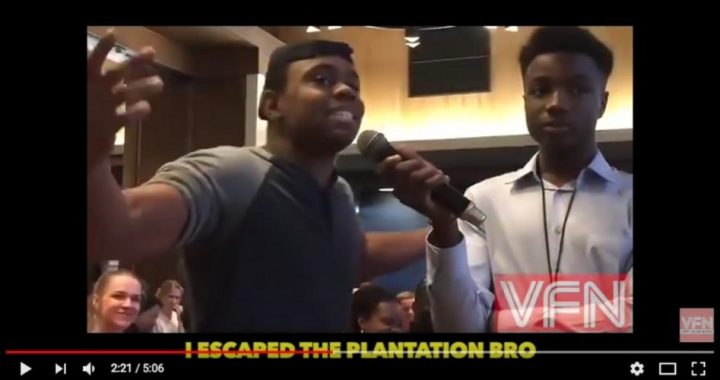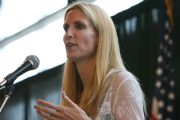
“White liberals don’t really care about black people.… I’m off the plantation, bro! … I escaped the plantation, bro,” freshman student Ebbie Banks said at an event hosted by the Stanford College Republicans, in an illustration of the growing disenchantment with liberalism. The 20-year-old black student’s powerful speech has “gone viral” (video below).
Banks continued, “I’m empowered. They don’t want me to have power. They want to keep me dependent.”
Candace Owens, who was featured at the event along with fellow Turning Point USA’s Charlie Kirk, referred to the Banks’ comments as indicative of a growing “Black Revolution” against the continued reliance upon the black community’s subjection to the causes of the Left. “The world is changing before our eyes,” Owens tweeted. “Tonight at Stanford, a black student stepped to the mic. He said he used to support Black Lives Matter until he researched their lies.… The Black Revolution is unfolding and it’s beautiful.”
Owens is a key figure in the budding movement among African-Americans to question the use of blacks by American liberals to advance their causes. Banks was energized by Owens’ message at the event that he should “be a victor and not a victim.” Banks explained the next day, “A lot of this stuff I alluded to yesterday came from an emotional place. She spoke to me when she was talking about the victimhood culture, freeing yourself from the victimhood culture helped me.”
A principal figure in organizing the event was John David Rice-Cameron, president of the Stanford College Republicans and activism director of the California College Republicans. He is also the son of Susan Rice, who was secretary of state in the Obama administration.
Rice-Cameron told Fox News that he and his mother “disagree on most of the standard Republican/Democrat disagreements.” He explained that he began to move away from his parents’ liberal Democrat philosophy by listening to conservative radio hosts Rush Limbaugh and Mark Levin.
“I’m driven by a fundamental sense of urgency over the fact that Americans are slowly losing their liberty, and I believe that liberty is being valued less and less. I want to turn the tide, and college campuses are crucial to doing so,” Rice-Cameron asserted, in explaining the motivation for his activism in the College Republicans.
Many Americans were surprised — if not shocked — when Kanye West recently went public with his admiration for President Donald Trump. But West’s support for Trump is not the only indication that he and some other black Americans are beginning to question the narrative that a black person must automatically be a liberal Democrat. The controversial rapper has reportedly become an avid reader of noted black conservative economist Thomas Sowell, now retired. West has tweeted some of Sowell’s incisive observations, including, “The welfare state is not really about the welfare of the masses. It is about the egos of the elites,” and “Socialism in general has a record of failure so blatant that only an intellectual could ignore or evade it.”
The remarks by West coincided with a realization that the number of blacks — especially black men — who support President Trump is growing. While the number of blacks who approve of Trump’s job performance is still a minority, some data indicate a doubling of support since the 2016 election.
This is part of the growth of a “conservative” movement among African-Americans. Candace Owens, for example, who was featured at the Stanford event, is a recent convert herself. “I love the way Candace Owens thinks,” West tweeted in April. Owens operates the website Red Pill Black that promotes black conservativism in the United States.
Owens has argued that the American Left “like black people to be government-dependent.” While Owens is not uniformly conservative, she takes multiple positions that are: She is critical of affirmative action, desires to see Planned Parenthood defunded (arguing that the pro-choice movement is just about “population control,”) is a member of the National Rifle Association, is critical of open borders, is for abolition of the minimum wage, and is a critic of the war on drugs.
The significance of the growing openness of many in the black community to conservative positions and philosophy is that the Democratic Party and the liberal establishment, in order to remain in power, absolutely must have the near-universal support among blacks that they have enjoyed for over half a century. It is commonly believed today, for example, that blacks have always supported the Democratic Party and left-wing causes — but this is simply not the case.
In 1960, Republican presidential candidate Richard Nixon received 32 percent of the black vote. Up until the Great Depression, a majority of blacks voted Republican. After the passage of the 1964 Civil Rights Act, led by Democrat president Lyndon Johnson, the black vote for Democrats became almost monolithic (despite the fact that a larger percentage of Republican members of Congress voted for the act than did Democrats).
Since that time, the Democratic Party has become so dependent upon the black vote that an increase from five percent of blacks voting Republican to, say, 25 percent voting Republican would be devastating to the Democrats. That is why blacks who drift off the “Liberal Plantation” are routinely, quickly, and viciously demonized.
Perhaps the best example was the attempt to destroy Clarence Thomas when he was nominated to serve on the Supreme Court in 1991. Clearly, the Left did not want Thomas on the court, rendering decisions not to their liking. But even more than that, Thomas was viewed as someone who could become a role model for other blacks, who would admire him and his conservative philosophy.
Other blacks such as Mia Love, Allen West, Herman Cain, and Ben Carson have been on the receiving end of savage attacks when they dared to espouse more conservative views. Even a black personality such as Colin Powell, who was hardly conservative, got the negative treatment by some liberals, as he was compared to a “house slave” simply because he served in the presidential administrations of three Republican presidents.
As is the case with all voters, the greatest single influence on a person’s party identification is their family. If both parents clearly identify with a political party, their children will most likely do the same. After so many decades of regularly voting for Democrats, support for the Democratic Party among African-Americans has become a strong family tradition.
But with a growing recognition that liberalism has done nothing for those black families, and has, in fact, done much to destroy the black family, that may be about to change, at least to some extent.
Image: screenshot of YouTube video of Banks speaking



